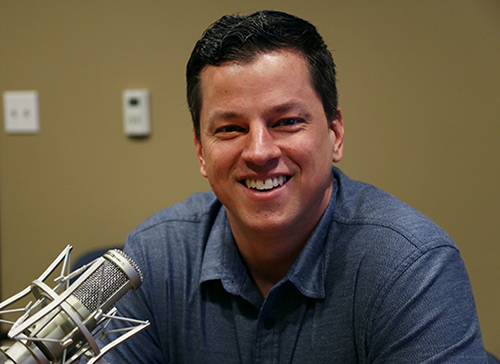David Puder, MD, wants every healthcare provider to know that whether they realize it or not, their interactions with a patient happen on a psychological level. His new podcast — “Psychiatry and Psychotherapy Podcast” — is intended to educate and encourage providers to use that psychological connection to understand and improve patient outcomes and reduce the stigma of mental illness.
“There was a study done that looked at physicians treating patients with diabetes. Those who were more empathic were 40 percent less likely to have complications in their patients than physicians who were less empathic,”* Puder said. “There’s also a psychological component to getting patients to take their medication. If they feel connected to their physician, they’re more likely to take their meds.”
Light and conversational, the weekly podcast covers topics ranging from stress to women’s health, teen suicide and how pharmaceuticals interact with individual genetics.
“Any doctor is going to be interested in this because the topics bleed into every medical specialty,” Puder said.
Puder is collaborating with colleagues and students to produce the podcast. They spend weeks or months reviewing papers, asking questions and sharing notes. Once they’re finished, Puder and his collaborator record a conversation on the topic.
“A cool thing about a podcast is you can be motivational and encouraging,” he said. “The people whose podcasts I listen to a lot — you feel almost a camaraderie with them. It’s like they’re friends.”
Creating that friendly dialogue is something that’s important to him. When Puder researched existing psychology podcasts, he found that most were formal and stiff — in short, not conducive to learning.
“Think about PowerPoints. Your brain shuts down after a while. It’s one-way communication,” Puder explained. “People were built to learn in conversation. Our brains pick up information when it’s a dialogue.”
He hopes the podcast will create a dialogue that helps listeners come away with an understanding of the basic scientific principles that inform psychology — and he’s well on his way. Just one month after launching the podcast in mid-January, Puder had nearly 2,000 subscribers and was ranked as the No. 4 psychology podcast on iTunes.
“If people believe that the psychiatrist is not a big, bad, scary figure, and they believe they’re coming to a place where they are going to be treated by experts — which they are — they are more likely to seek treatment and get help and get better,” he said. “I think this could go a long way in educating people in that way.”
The show can be found on iTunes, Google Play and other major podcast apps.
*Del Canale, S., Louis, D. Z., Maio, V., Wang, X., Rossi, G., Hojat, M., & Gonnella, J. S. (2012). The relationship between physician empathy and disease complications: an empirical study of primary care physicians and their diabetic patients in Parma, Italy. Academic Medicine, 87(9), 1243-1249.

